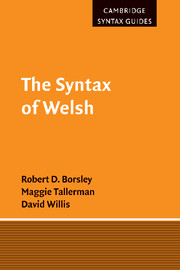3 - Non-finite verbs and infinitival clauses
Published online by Cambridge University Press: 01 October 2009
Summary
Non-finite verbs: verbal and nominal properties
The non-finite verb form
Welsh verbs have only one non-finite form, which we will generally refer to as a non-finite verb or an infinitive; the form is glossed throughout as ‘INF(INITIVE)’. In Welsh traditional grammar, the non-finite form is known as a ‘verb-noun’ (berfenw), reflecting the traditional view that the form has the properties of both a verb and a noun, and is therefore neither fully in one category nor the other. In this section, we will show that this is a misleading characterization.
The non-finite form consists either of the bare verb stem, or of the stem plus one of a number of suffixes. Examples of the former include darllen, ‘read’, disgwyl, ‘expect’, eistedd, ‘sit’, ennill, ‘win’ and ateb, ‘reply’. Infinitives formed by the addition of a suffix are often derived from nouns or adjectives. The most common suffixes by far are -u, -i and -o/-io, as in credu (cred-u), ‘believe’, meddwi (meddw-i) ‘to get drunk’, bwydo (bwyd-o) ‘feed’ and herio (her-io) ‘challenge’. Established loan words from English commonly take the -io suffix too, such as peint-io ‘paint’, and this suffix is also heavily used to form Welsh verbs in nonce borrowings. A number of other infinitival suffixes occur in addition, but with a much more limited distribution: for instance, -ed, e.g. clywed, ‘hear’, cerdded, ‘walk’; -ian, e.g. sgrechian, ‘screech’; and -a, used in some infinitives formed from nouns, e.g. gwledda ‘feast’ (< gwledd ‘feast’ (n.)).
Although closely related Breton has a past participle, Welsh has no participial forms at all, and the infinitival form is used in all syntactic contexts requiring a non-finite verb. Examples (1) and (2) illustrate two contexts which in English require (present and past) participial verb forms.
- Type
- Chapter
- Information
- The Syntax of Welsh , pp. 68 - 103Publisher: Cambridge University PressPrint publication year: 2007

